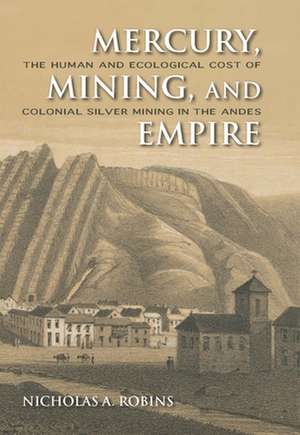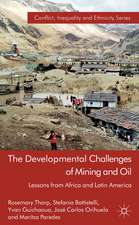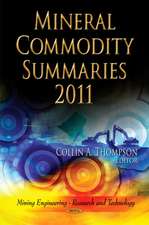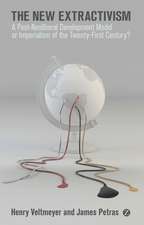Mercury, Mining, and Empire – The Human and Ecological Cost of Colonial Silver Mining in the Andes
Autor Nicholas A. Robinsen Limba Engleză Hardback – 24 iul 2011
Preț: 294.95 lei
Nou
Puncte Express: 442
Preț estimativ în valută:
56.44€ • 60.35$ • 47.06£
56.44€ • 60.35$ • 47.06£
Carte tipărită la comandă
Livrare economică 18 aprilie-02 mai
Preluare comenzi: 021 569.72.76
Specificații
ISBN-13: 9780253356512
ISBN-10: 0253356512
Pagini: 320
Ilustrații: 14 maps
Dimensiuni: 158 x 235 x 28 mm
Greutate: 0.57 kg
Editura: MH – Indiana University Press
ISBN-10: 0253356512
Pagini: 320
Ilustrații: 14 maps
Dimensiuni: 158 x 235 x 28 mm
Greutate: 0.57 kg
Editura: MH – Indiana University Press
Cuprins
Preface; AcknowledgmentsIntroduction; 1. Amalgamating an Empire; 2. Toxic Travails: Mining in Huancavelica; 3. Blood Silver; 4. Connecting the Drops: The Wider Human and Environmental Costs; 5. From Corrosion to Collapse: The Destruction of Native Communities; ConclusionGlossary; Notes; Bibliography; Index
Recenzii
"This is interdisciplinary history at its best. A path-breaking study that... Will certainly be a 'must-read' book." David Cahill, University of New South Wales
"Overall, this is a fantastic book that brings together environmental, labor, and colonial history, confirming the contributions of environmental studies to understanding the past. ... Highly recommended." Choice, March 2012
"The book itself is a distinguished contribution to the polemic on mining, colonialism, and socio-environmental degradation. It will make for a strong addition to undergraduate and graduate lists. Robins's synthetic skills, the descriptive richness of the historical source work, the verve of the writing, and the passion of the argument, all combine to make Mercury, Mining, and Empire a book to be reckoned with." Daviken Studnicki-Gizbert, H-Environment, August 2012
In Mercury, Mining and Empire, Nicholas Robins provides a superbly researched piece of interdisciplinary history that argues that the post-Conquest genocide of the indigenous population of what is now Bolivia and Peru occurred as a result of a highly exploitative system of silver and mercury mining. Thus Robins analyzes a double genocide that initially entailed the death of up to ninety percent of the indigenous peoples due to illnesses brought to the Americas by the Spanish, and continued with the subsequent genocidal destruction wrought by the toxic effects of the emerging mining industry. - Journal of Genocide Research, 2012
"This is interdisciplinary history at its best. A path-breaking study that... Will certainly be a 'must-read' book." David Cahill, University of New South Wales "Overall, this is a fantastic book that brings together environmental, labor, and colonial history, confirming the contributions of environmental studies to understanding the past. ... Highly recommended." Choice, March 2012 "The book itself is a distinguished contribution to the polemic on mining, colonialism, and socio-environmental degradation. It will make for a strong addition to undergraduate and graduate lists. Robins's synthetic skills, the descriptive richness of the historical source work, the verve of the writing, and the passion of the argument, all combine to make Mercury, Mining, and Empire a book to be reckoned with." Daviken Studnicki-Gizbert, H-Environment, August 2012 "In Mercury, Mining and Empire, Nicholas Robins provides a superbly researched piece of interdisciplinary history that argues that the post-Conquest genocide of the indigenous population of what is now Bolivia and Peru occurred as a result of a highly exploitative system of silver and mercury mining. Thus Robins analyzes a 'double genocide' that initially entailed the death of up to ninety percent of the indigenous peoples due to illnesses brought to the Americas by the Spanish, and continued with the subsequent genocidal destruction wrought by the toxic effects of the emerging mining industry." - Journal of Genocide Research, 2012
"Overall, this is a fantastic book that brings together environmental, labor, and colonial history, confirming the contributions of environmental studies to understanding the past. ... Highly recommended." Choice, March 2012
"The book itself is a distinguished contribution to the polemic on mining, colonialism, and socio-environmental degradation. It will make for a strong addition to undergraduate and graduate lists. Robins's synthetic skills, the descriptive richness of the historical source work, the verve of the writing, and the passion of the argument, all combine to make Mercury, Mining, and Empire a book to be reckoned with." Daviken Studnicki-Gizbert, H-Environment, August 2012
In Mercury, Mining and Empire, Nicholas Robins provides a superbly researched piece of interdisciplinary history that argues that the post-Conquest genocide of the indigenous population of what is now Bolivia and Peru occurred as a result of a highly exploitative system of silver and mercury mining. Thus Robins analyzes a double genocide that initially entailed the death of up to ninety percent of the indigenous peoples due to illnesses brought to the Americas by the Spanish, and continued with the subsequent genocidal destruction wrought by the toxic effects of the emerging mining industry. - Journal of Genocide Research, 2012
"This is interdisciplinary history at its best. A path-breaking study that... Will certainly be a 'must-read' book." David Cahill, University of New South Wales "Overall, this is a fantastic book that brings together environmental, labor, and colonial history, confirming the contributions of environmental studies to understanding the past. ... Highly recommended." Choice, March 2012 "The book itself is a distinguished contribution to the polemic on mining, colonialism, and socio-environmental degradation. It will make for a strong addition to undergraduate and graduate lists. Robins's synthetic skills, the descriptive richness of the historical source work, the verve of the writing, and the passion of the argument, all combine to make Mercury, Mining, and Empire a book to be reckoned with." Daviken Studnicki-Gizbert, H-Environment, August 2012 "In Mercury, Mining and Empire, Nicholas Robins provides a superbly researched piece of interdisciplinary history that argues that the post-Conquest genocide of the indigenous population of what is now Bolivia and Peru occurred as a result of a highly exploitative system of silver and mercury mining. Thus Robins analyzes a 'double genocide' that initially entailed the death of up to ninety percent of the indigenous peoples due to illnesses brought to the Americas by the Spanish, and continued with the subsequent genocidal destruction wrought by the toxic effects of the emerging mining industry." - Journal of Genocide Research, 2012
Notă biografică
Descriere
Discusses the effects of mercury pollution on the indigenous peoples of Peru and Bolivia








